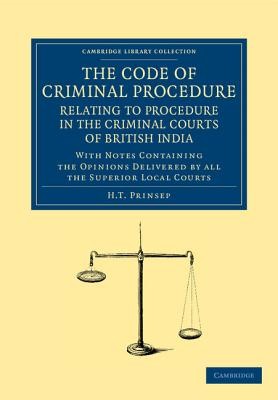
- We will send in 10–14 business days.
- Author: H T Prinsep
- Publisher: Cambridge University Press
- ISBN-10: 1108046150
- ISBN-13: 9781108046152
- Format: 17 x 24.4 x 2.8 cm, softcover
- Language: English
- SAVE -10% with code: EXTRA
The Code of Criminal Procedure Relating to Procedure in the Criminal Courts of British India (e-book) (used book) | bookbook.eu
Reviews
Description
Henry Thoby Prinsep (1792-1878), a colonial administrator who reached the highest rank in the East India Company and its successor, the Council of India, published this Code of Practice in 1866: the third edition of 1869, reissued here, was necessitated by new legislation in that year. (Prinsep's earlier work, Origin of the Sikh Power in the Punjab, is also reissued in this series.) In the preface to this work, written as a guide for local magistrates and administrators, Prinsep states his intent to present, in a convenient form, all the rules of procedure in the criminal courts of British India. Each stage of the process is annotated with explanatory material, and case law and precedents are also cited where appropriate. Appendices contain further relevant legislation, such as rules on extradition and the conduct of the police. An index of cases cited and a general index are also provided.
EXTRA 10 % discount with code: EXTRA
The promotion ends in 17d.14:44:41
The discount code is valid when purchasing from 10 €. Discounts do not stack.
- Author: H T Prinsep
- Publisher: Cambridge University Press
- ISBN-10: 1108046150
- ISBN-13: 9781108046152
- Format: 17 x 24.4 x 2.8 cm, softcover
- Language: English English
Henry Thoby Prinsep (1792-1878), a colonial administrator who reached the highest rank in the East India Company and its successor, the Council of India, published this Code of Practice in 1866: the third edition of 1869, reissued here, was necessitated by new legislation in that year. (Prinsep's earlier work, Origin of the Sikh Power in the Punjab, is also reissued in this series.) In the preface to this work, written as a guide for local magistrates and administrators, Prinsep states his intent to present, in a convenient form, all the rules of procedure in the criminal courts of British India. Each stage of the process is annotated with explanatory material, and case law and precedents are also cited where appropriate. Appendices contain further relevant legislation, such as rules on extradition and the conduct of the police. An index of cases cited and a general index are also provided.


Reviews